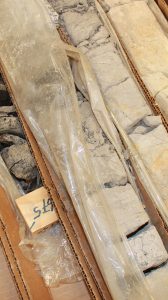
Brian Platt, UM assistant professor of geology and geological engineering, is using a National Science Foundation fellowship to research geological drill core samples from Mississippi at the Continental Scientific Drilling Coordination Office in Minnesota. Photo by Shea Stewart
A University of Mississippi professor has been awarded a National Science Foundation fellowship to advance his innovative research.
Brian Platt, assistant professor of geology and geological engineering, was awarded funding through a foundation program that provides opportunities for young university investigators to boost their research abilities via extended collaborative visits to research centers across the country. Platt will conduct his research into geological drill core samples from Mississippi at the Continental Scientific Drilling Coordination Office at the University of Minnesota.
For Platt, who joined the Ole Miss faculty in 2013, the fellowship will help him meet a personal objective.
“When I began working at the University of Mississippi, one of my goals was to establish a research program that used Mississippi geology to address broader-scale climatic and environmental issues,” he said. “To me, receiving this fellowship means that I am well on my way to meeting that goal.”
The National Science Foundation program is funded through the Established Program to Stimulate Competitive Research, or EPSCoR, program. The Research Infrastructure Improvement Track 4: EPSCoR Research Fellows program allows fellows to “learn new techniques, develop new collaborations or advance existing partnerships, benefit from access to unique equipment and facilities, and/or shift their research toward potentially transformative new directions.”
While enhancing his research trajectory, Platt also is expected to use his new knowledge to benefit the university’s research capacity.
“UM is proud of this new award for Dr. Platt,” said Josh Gladden, the university’s vice chancellor for research and sponsored programs. “A unique aspect of these awards is that they help fund collaborative work between faculty across institutions.
“Such collaborations are crucial for all robust research environments and often lead to new ideas and breakthroughs.”

These geological drill core samples from Mississippi are from more than 60 feet below the surface and are over 56 million years old. Photo by Shea Stewart
A rock collection purchased by his parents at a garage sale introduced Platt to geology as a boy, and he vividly recalls smashing the pieces of granite with a hammer to try to separate and identify the individual minerals that composed the rocks.
His research is focused on employing geological drill core samples from deep below the Earth that can be used to reconstruct long-term changes in ancient environments and climates.
Platt’s fellowship will allow him and a graduate assistant to make two extended visits to the Continental Scientific Drilling Coordination Office, where they will examine existing core from Mississippi drilled by the UM Mississippi Mineral Resources Institute.
“I plan to learn 14 new techniques for analyzing core; this will produce multiple sets of data spanning up to 360 feet of core,” he said. “The (Mississippi) core contains rocks and sediments from (an epoch) known as the Paleocene, meaning that they are over 56 million years old.
“The time interval sampled by the core preceded several episodes of rapid global warming, which are thought to be the best ancient analogs for projected future climate change. But to properly understand the effects of the ancient warming episodes, we need to know about background climate and environmental conditions before the changes occurred. A result of this project will allow me and my colleagues to interpret what Mississippi was like during the Paleocene.”
Funded by National Science Foundation award No. 1929145 for $174,430, Platt’s project is titled “Establishing Baseline Critical Zone Conditions in Mississippi Prior to the Onset of Paleocene-Eocene Hyperthermals.” The project is projected to run through Nov. 30, 2021.